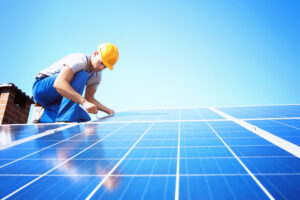
Are Solar Panels Safe? A Comprehensive Buyers Guide
As the world turns more and more towards sustainable energy, solar panels are increasingly becoming a common sight in many neighborhoods. But you may be wondering, are solar panels safe? In this guide, we will delve into solar panel safety, the benefits of going solar, and the costs associated with installing a solar panel system.
COMPARE SOLAR QUOTESSolar Panel Safety for Your Home
When considering a solar system for your home, safety is undoubtedly a crucial factor. Solar panels, composed of numerous solar cells, convert sunlight directly into electricity, which is then used to power your home.
Solar panels are designed to be safe and pose a minimal risk when installed and maintained properly. They are subject to rigorous testing and must meet the industry standard safety and quality requirements before they are allowed on the market. Panels are designed to withstand harsh weather conditions like hail, heavy rain, and high winds. In the unlikely event of a panel malfunction, most systems come equipped with safety measures to prevent any electrical issues from spreading throughout the system.
Moreover, solar panels don’t have moving parts, reducing the risk of mechanical failures or fire hazards. They are often installed on rooftops, minimizing the risk of accidents or damage from ground-based hazards.
Health Risks and Safety Concerns of Solar Panels
Solar panels, as with any electrical system, do come with some risks. However, when compared to other forms of energy production, the risks are relatively minor.
Health Risks
The primary health concerns associated with solar panels are related to the manufacturing process rather than their operation. The production of solar panels involves the use of certain hazardous materials. However, these substances are safely contained within the solar cells in the completed panels and pose no risk to homeowners or the environment under normal operating conditions.
It’s also important to note that solar panels emit no radiation or harmful emissions once installed, making them a clean energy choice.
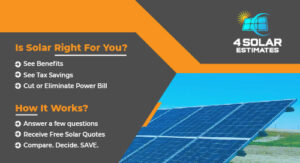
The Biggest Risks
The most significant risk associated with solar panels is potential electrical hazards. These can occur due to faulty wiring, poor installation, or lack of maintenance. However, these risks can be effectively mitigated by choosing reputable solar installers and conducting regular system checks.
Another concern is the weight of the solar array on your roof. A professional installer will assess your roof’s structural integrity before installation to ensure it can safely support the panels.
Safe Distance from a Solar Inverter
Solar inverters convert the direct current (DC) power generated by your solar panels into alternating current (AC) power used in your home. As with all electrical equipment, it’s recommended to keep a safe distance. While the exact distance can depend on the specific model and installation, a minimum distance of three feet is generally recommended for safety and ease of maintenance.
COMPARE SOLAR QUOTESThe Benefits of Solar Panels
Solar panels offer numerous benefits. They are an effective way to reduce your energy costs, and in some cases, you may even be able to sell excess energy back to the grid. Solar panels also reduce your carbon footprint, making your home more environmentally friendly.
- Reduced Electricity Bills: Solar panels generate free electricity for your home, significantly reducing your electricity bills. With net metering, you can even feed excess power back into the grid and receive credits on your bill.
- Clean and Renewable Energy: Solar energy is a renewable resource, and harnessing it reduces your carbon footprint.
- Increased Property Value: Homes with solar energy systems are often more attractive to potential buyers, leading to higher resale values.
- Energy Independence: With a solar energy system, you’re less reliant on the grid, providing a degree of energy independence.
Beyond these benefits, solar panels can increase your property’s value. Many prospective homeowners view solar panels as a desirable feature, recognizing the savings they can bring in the long term.
Choosing the Best and Safest Solar Panels
When choosing solar panels, prioritize quality and safety. Look for panels from reputable manufacturers that meet international safety standards. High-efficiency monocrystalline panels are often a good choice for their superior performance and longevity.
Remember, the best solar panels for you will depend on your specific needs and circumstances, including your budget, available roof space, and local climate. Consulting with a professional solar installer can help guide you in making an informed decision.
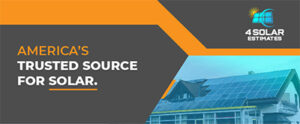
How to Find the Best and Safest Solar Panel Types and Brands
Solar panels come in three main types: monocrystalline, polycrystalline, and thin film. Each type has its own advantages and disadvantages, and the best one for you depends on your specific needs and circumstances.
Monocrystalline Solar Panels
Monocrystalline panels are considered the premium solar product. They are made from a single crystal structure, which allows electrons more room to move, resulting in higher efficiency. These panels have a sleek, uniform look and take up less space than other types.
Polycrystalline Solar Panels
Polycrystalline panels are made from multiple crystal structures, which results in slightly lower efficiency. However, they are less expensive than monocrystalline panels, making them a popular choice for homeowners on a budget.
Thin-Film Solar Panels
Thin-film panels are the least expensive option and have the lowest efficiency. However, they have a sleek, modern aesthetic and are flexible, making them suitable for certain applications where traditional panels can’t be used.
COMPARE SOLAR QUOTESWhen it comes to the safest and best solar panel brands, here are a few to consider:
- SunPower: SunPower offers some of the most efficient solar panels on the market. Their panels are made from high-quality monocrystalline silicon and come with a comprehensive 25-year warranty.
- LG: LG is a trusted brand in the electronics industry, and its solar panels are no exception. They offer a range of high-quality monocrystalline panels with excellent warranties.
- Panasonic: Panasonic offers a unique solar panel design with high efficiency and excellent temperature coefficient ratings, making them a good choice for hotter climates.
- Canadian Solar: Canadian Solar is known for producing high-quality solar panels at an affordable price. They offer both monocrystalline and polycrystalline panels.
- First Solar: First Solar is a leading brand in the thin-film sector. Their panels offer good efficiency for thin film and excellent temperature coefficient ratings.
Remember, choosing the best and safest solar panels also involves selecting a reputable installer. A professional installer will ensure your panels are installed correctly and safely, maximizing their lifespan and efficiency.
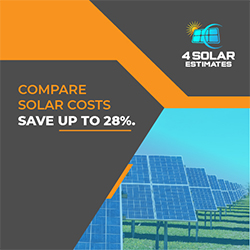
Top Reasons Why Solar Power Systems are a Safe Option
Solar power systems are not just environmentally friendly — they’re also a safe option for powering your home. Here are some top reasons why:
- Safe Operation: Solar panels produce electricity through photovoltaic cells, which don’t have any moving parts. This means there are fewer risks of mechanical failures or fires compared to other energy systems.
- Reduced Electrical Grid Dependence: By producing your own electricity, you reduce your reliance on the grid, making you less susceptible to blackouts or power outages.
- Low Maintenance: Solar panels require minimal maintenance. Once installed, they can last for decades with only periodic cleaning and inspection.
- Energy Independence: Solar power gives you control over your energy supply, reducing your dependence on utility companies and their fluctuating prices.
- Financial Security: With a solar system, you can lock in your electricity rate for the life of the system, providing certainty and protection against rising energy costs.
The Best Solar Company to Work With
Choosing the right solar company is crucial in ensuring you get the best system for your needs. Here are some of the best solar companies in the industry:
- Sunrun: Known for its leasing options, Sunrun offers solar systems with little to no upfront costs and affordable monthly payments. They also provide a comprehensive service, including system design, installation, and maintenance.
- Tesla Energy: Tesla not only produces electric cars but also high-quality solar panels and the innovative Solar Roof. Tesla Energy offers competitive pricing and a comprehensive warranty.
- SunPower: SunPower is known for its high-efficiency, durable solar panels. They offer comprehensive solar solutions, from design and installation to maintenance.
- Vivint Solar: Vivint Solar provides a wide range of solar services, including purchase, lease, and power purchase agreement (PPA) options. They’re known for their smart home integration.
- LG Solar: If you’re buying solar panels, LG is a solid option. They manufacture high-efficiency panels with a strong warranty.
When selecting a solar company, consider factors such as its reputation, product quality, warranty, and customer service. It’s also important to compare quotes from different providers to ensure you’re getting the best deal.
COMPARE SOLAR QUOTESChoosing to go solar is a significant decision, but it’s one that can bring considerable benefits. By understanding the safety, benefits, and costs associated with solar power, as well as the top companies in the industry, you’ll be well-equipped to make an informed choice.
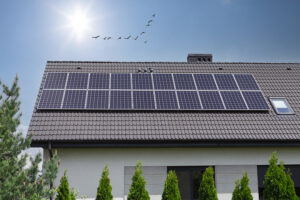
The Cost of Solar Panels
The cost of solar panels has significantly decreased over the years, making them more affordable for the average homeowner. The cost of a solar panel system will depend on various factors such as the size of the system, the type of panels (monocrystalline panels are typically more efficient), and whether you choose to buy or lease the system.
- If you choose to purchase your solar panels, you can expect to pay upfront, but you will own the system and all the power it produces.
- On the other hand, a power purchase agreement allows you to lease the system and pay for the power it produces at a predetermined rate.
- However, it’s essential to remember that while the initial investment might seem high, the return on investment over time makes solar panels an attractive option.
- Many regions also offer tax credits and incentives for solar power, which can help offset the initial costs.
Solar panels are safe and a worthwhile investment for many homeowners. When installed correctly and maintained, a solar panel system can provide substantial benefits, both economically and environmentally. Whether you’re committed to sustainable living, or you’re looking to save on your energy bills, solar power is an option worth considering.
Understanding the Costs: Installation, Purchase, and Federal Tax Credits
The cost of solar panels can vary greatly depending on the size of the system you need, the type of solar panels you choose, and the complexity of the installation. Here, we’ll break down these costs and discuss the federal tax credit that can help offset them.
Average Installation Cost of Solar Panels
The average installation cost of solar panels in the United States is between $15,000 and $25,000 after tax credits. This equates to around $2.50 to $3.50 per watt. However, this price can vary depending on several factors, including your location, the size of the system, the type of panels used, and the complexity of the installation.
For example, if you have a large roof with easy access and are installing a standard system, your costs may be on the lower end. However, if your roof is small or difficult to access, or if you require a more complex system, the cost may be higher.
Total Cost of Buying Solar Panels
The total cost of buying solar panels typically includes the panels themselves, the inverter, mounting hardware, and other necessary components. The panels are usually the most expensive component, with prices ranging from around $0.50 to $1.00 per watt for polycrystalline and thin-film panels and from $1.00 to $2.00 per watt for monocrystalline panels.
Overall, you can expect to spend between $3,000 and $10,000 on the equipment alone for a typical residential solar panel system. However, keep in mind that this is a rough estimate and the actual cost can vary greatly depending on the specifics of your project.

Federal Tax Credits
The federal solar tax credit, also known as the Investment Tax Credit (ITC), allows you to deduct 26% of the cost of installing a solar energy system from your federal taxes in 2023. This applies to both residential and commercial systems, and there is no cap on its value.
The ITC is a major incentive for going solar, as it can significantly reduce the net cost of your system. However, keep in mind that the ITC rate is set to decrease to 22% in 2023 and is scheduled to expire entirely for residential systems after 2023 unless Congress renews it. In addition to the federal ITC, many states, local governments, and utilities also offer rebates and incentives for solar energy, further reducing the cost.
COMPARE SOLAR QUOTESNavigating the world of solar power can be complex, but the benefits – both to your wallet and to the planet – can be immense. The key is to do your research, understand your needs, and choose the best and safest solar panels for you.
The Role of Your Utility Company in Solar Power
Your utility company plays a crucial role in your solar power journey. After your solar panels are installed, they will remain connected to the grid. This is beneficial for a number of reasons.
When your solar panels produce more energy than you need, the excess energy is fed back into the grid. This process is known as net metering. Your utility company will credit you for this excess power, effectively reducing your electricity bill.
However, when your solar panels aren’t producing enough electricity (at night, for instance), you can draw power from the grid. The relationship between solar power users and their utility companies is thus symbiotic and usually regulated by state laws.
How Much Energy Can Solar Panels Produce?
The amount of energy your solar panels can produce depends on several factors: the type of solar panel, the size of your solar system, the angle and orientation of your panels, and the amount of sunlight your location receives.
Typically, a standard home installation might include 20 to 25 panels, each capable of producing 250 to 300 watts in ideal conditions. This means your system could generate 5 to 7.5 kilowatts per hour of direct sunlight.
Keep in mind that actual production will often be less than this due to various factors such as shading, panel angle, and local weather conditions. A reputable solar company can conduct a site assessment and provide a more accurate estimate of how much energy your system can produce.
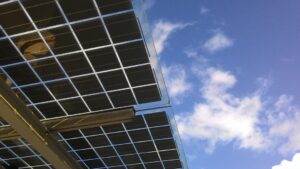
Understanding Different Types of Solar Panels
There are three main types of solar panels used in home installations mentioned above: monocrystalline, polycrystalline, and thin-film. Below we will take a deeper dive into their energy efficiency.
- Monocrystalline panels are the most efficient and the most expensive. They’re made from a single crystal structure, which allows the electrons to flow more easily, resulting in a higher efficiency rating.
- Polycrystalline panels are slightly less efficient and less expensive. They’re made from multiple crystal structures, which can hinder the flow of electrons.
- Thin-film panels are the least efficient and the cheapest. They’re easy to produce and have a sleek appearance but require more space to produce the same amount of power as mono or polycrystalline panels.
Choosing the right type of solar panel depends on your budget, space, and energy needs.
Financing Solar Panels: The Solar Loan
The upfront cost of solar panels can be significant. Fortunately, there are financing options available, such as solar loans. Solar loans allow you to borrow money to pay for your solar system, which you then pay back over time, often with interest.
There are two main types of solar loans: secured and unsecured. Secured loans require you to use your home or the solar system itself as collateral. They generally have lower interest rates than unsecured loans but come with the risk of losing your collateral if you can’t make the payments.
Unsecured loans do not require collateral, but they typically have higher interest rates. When considering a solar loan, look for options that have no prepayment penalties and terms that match the length of the warranty on your solar system. Remember, the right financing option for you will depend on your financial situation, the cost of the system, and the terms of the loan. It’s important to shop around and compare offers before making a decision.
COMPARE SOLAR QUOTES
Leave a Reply